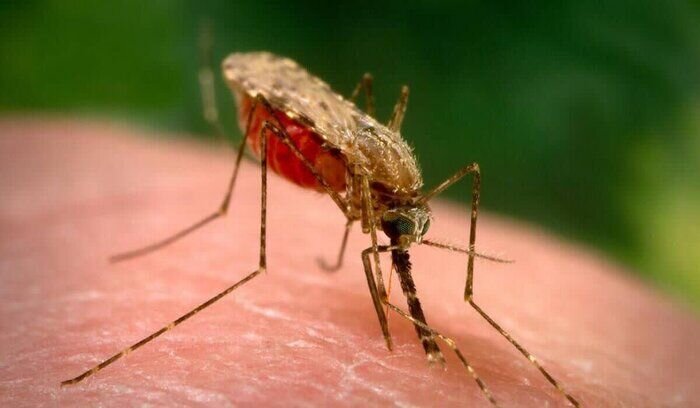No indigenous malaria cases identified in Iran

TEHRAN –All malaria cases in Iran are diagnosed in travelers and immigrants commuting to the country from Afghanistan and Pakistan, and no indigenous cases of the disease have been identified so far, IRNA quoted deputy health minister Hossein Farshidi as saying.
Malaria is a mosquito-borne infectious disease that affects humans and other animals; the disease is most commonly spread by an infected female Anopheles mosquito. The mosquito bite introduces the parasites from the mosquito's saliva into a person's blood.
It causes symptoms that typically include fever, tiredness, vomiting, and headaches. In severe cases, it can cause yellow skin, seizures, coma, or death. Symptoms usually begin ten to fifteen days after being bitten by an infected mosquito.
Despite Iran’s great achievements in eradicating the disease for approximately four years from 1397 ( March 2018 - March 2019) to 1400 ( March 2021 – March 2022), an upward trend of malaria infections has been recorded in the country, with 10,000 cases reported only last year (March 2023- March 2024).
The surge in the number of malaria cases is mainly attributed to climate change which has resulted in widespread floods in different countries, particularly Pakistan. This environmental impact has already disturbed malaria eradication program in Iran.
In February, Farshidi pointed out that climate change has increased malaria transmission, “Climate change has also contributed to the increase in the number of other diseases such as asthma and similar cases.”
The increase in temperature is directly associated with an increase in the causes of deaths and disabilities, specifically cardiovascular diseases, Farshidi added.
Stating that the challenge is a universal one observed in most countries, he said, a country, a region, or a continent cannot take action by itself to deal with climate change impacts. Since it is affecting human health, we all have to cooperate to maintain human health.
Farshidi went on to say that the Ministry of Health and Medical Education has developed a section to act based on documents and scientific capacities in response to climate change.
All the organizations involved in this challenge, such as the ministries of Health, Industry and Mining, Agriculture, Transport, and Urban Development, should work together to mitigate the impacts of climate change and its consequences.
WHO, Japan help Iran combat malaria
The project, entitled Reinforcing Malaria Elimination as Humanitarian Assistance in the Islamic Republic of Iran, will run throughout 2024. WHO is implementing the project with the Iranian Ministry of Health and Medical Education, WHO website reported on March 20.
Sistan-Baluchestan was hit by heavy rainfall and flooding in February 2024. Cross-border population movement is constant in the south-eastern border provinces of the Islamic Republic of Iran. These and other conditions may further drive local transmission of malaria. As such, it is critical to put prevention and control measures in place.
Jaffar Hussain, WHO Representative and Head of Mission to the Islamic Republic of Iran, stressed the vital importance of collaborative action with the Government of Japan: “The financial support provided by the people of Japan arrives at a critical juncture, following recent heavy rains and floods in Sistan-Baluchestan province in late February 2024. Through concerted efforts and sustained investment, WHO and its international and local partners remain steadfast in their commitment to combat malaria and safeguard public health in the Islamic Republic of Iran and beyond.”
“The effect of climate change has led to frequent flooding in many parts of the world, including Iran,” said His Excellency Mr Tamaki Tsukada, Ambassador of Japan to the Islamic Republic of Iran. “Malaria, one of the world’s 3 major infectious diseases, spreads through mosquitoes after floods. In order to protect the Iranian people from malaria, it is important to exterminate mosquitoes, protect oneself from mosquitoes, and quickly diagnose and treat malaria cases at an early stage. We hope that this project will strengthen Iran’s crisis response capacity and prevent the spread of malaria and other infectious diseases.”
The country is prone to natural disasters, especially floods, and the Iranian health system remains vulnerable. More than one-third of the country’s 877 urban health centers are in flood-prone areas.
Japan’s funding aims to reduce the risk of malaria transmission in Sistan-Baluchestan province. WHO will support the Ministry of Health and Medical Education to enable indoor residual spraying and mosquito larviciding and to distribute pyrethroid-treated long-lasting insecticidal nets.
It will also support the Ministry to strengthen surveillance by enhancing laboratory diagnostics capacities to detect and diagnose malaria cases. Further, WHO will help improve risk communication and community engagement to reach target populations with appropriate health messages on how to protect against malaria.
MT/ MG
Leave a Comment